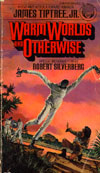
This is the James Tiptree, Jr. collection which contains the infamous introduction by Robert Silverberg in which he claims that Tiptree was not just a man, but indubitably a man, based on the text herein. Of course, Tiptree wasn’t a man, which Silverberg discovered in a personal note from Alice Sheldon to himself, recounted in an afterword to his introduction in this later edition of the collection. Silverberg, it should be noted, is extremely gracious in noting his mistake, saying that Sheldon fooled him–and most everyone–beautifully and “called into question the entire notion of what is ‘masculine’ and ‘feminine’ in fiction.” While the point is well taken, as Silverberg thanks Sheldon for forcing him to examine his preconceptions once again, I note that Tiptree had good practice at imitating a man long before she began to publish as one, as many women of her generation had to. I would like to think that this is one of the things that has changed; I fear that it isn’t.
Although Tiptree wrote masterfully about the differences and problems of the sexes (here in probably her best-known story, “The Women Men Don’t See”), to me she is at her best when commenting on the general human race (here in stories like “The Last Flight of Dr. Ain” and “On the Last Afternoon”). Not only had Tiptree discovered and was able to relate the differences between the sexes, but she had also found the similarities–that is, what made us “human.” And that, to me, is the purpose of all fiction.
[Finished 27 April 1993]
